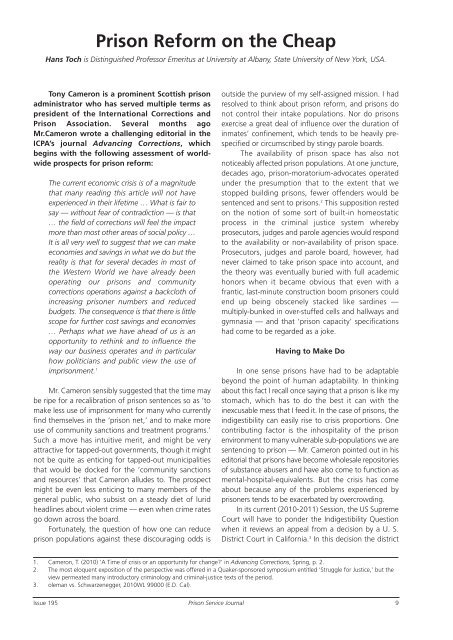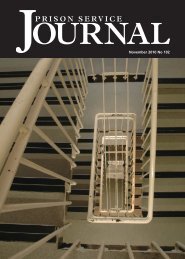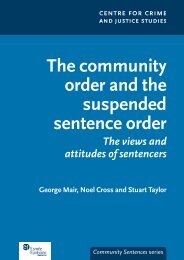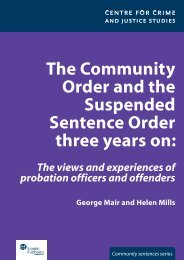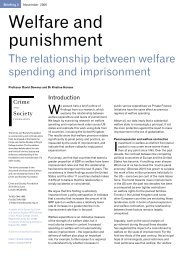Focus on Disability
Focus on Disability
Focus on Disability
Create successful ePaper yourself
Turn your PDF publications into a flip-book with our unique Google optimized e-Paper software.
Pris<strong>on</strong> Reform <strong>on</strong> the Cheap<br />
Hans Toch is Distinguished Professor Emeritus at University at Albany, State University of New York, USA.<br />
T<strong>on</strong>y Camer<strong>on</strong> is a prominent Scottish pris<strong>on</strong><br />
administrator who has served multiple terms as<br />
president of the Internati<strong>on</strong>al Correcti<strong>on</strong>s and<br />
Pris<strong>on</strong> Associati<strong>on</strong>. Several m<strong>on</strong>ths ago<br />
Mr.Camer<strong>on</strong> wrote a challenging editorial in the<br />
ICPA’s journal Advancing Correcti<strong>on</strong>s, which<br />
begins with the following assessment of worldwide<br />
prospects for pris<strong>on</strong> reform:<br />
The current ec<strong>on</strong>omic crisis is of a magnitude<br />
that many reading this article will not have<br />
experienced in their lifetime … What is fair to<br />
say — without fear of c<strong>on</strong>tradicti<strong>on</strong> — is that<br />
… the field of correcti<strong>on</strong>s will feel the impact<br />
more than most other areas of social policy …<br />
It is all very well to suggest that we can make<br />
ec<strong>on</strong>omies and savings in what we do but the<br />
reality is that for several decades in most of<br />
the Western World we have already been<br />
operating our pris<strong>on</strong>s and community<br />
correcti<strong>on</strong>s operati<strong>on</strong>s against a backcloth of<br />
increasing pris<strong>on</strong>er numbers and reduced<br />
budgets. The c<strong>on</strong>sequence is that there is little<br />
scope for further cost savings and ec<strong>on</strong>omies<br />
… Perhaps what we have ahead of us is an<br />
opportunity to rethink and to influence the<br />
way our business operates and in particular<br />
how politicians and public view the use of<br />
impris<strong>on</strong>ment. 1<br />
Mr. Camer<strong>on</strong> sensibly suggested that the time may<br />
be ripe for a recalibrati<strong>on</strong> of pris<strong>on</strong> sentences so as ‘to<br />
make less use of impris<strong>on</strong>ment for many who currently<br />
find themselves in the ‘pris<strong>on</strong> net,’ and to make more<br />
use of community sancti<strong>on</strong>s and treatment programs.’<br />
Such a move has intuitive merit, and might be very<br />
attractive for tapped-out governments, though it might<br />
not be quite as enticing for tapped-out municipalities<br />
that would be docked for the ‘community sancti<strong>on</strong>s<br />
and resources’ that Camer<strong>on</strong> alludes to. The prospect<br />
might be even less enticing to many members of the<br />
general public, who subsist <strong>on</strong> a steady diet of lurid<br />
headlines about violent crime — even when crime rates<br />
go down across the board.<br />
Fortunately, the questi<strong>on</strong> of how <strong>on</strong>e can reduce<br />
pris<strong>on</strong> populati<strong>on</strong>s against these discouraging odds is<br />
outside the purview of my self-assigned missi<strong>on</strong>. I had<br />
resolved to think about pris<strong>on</strong> reform, and pris<strong>on</strong>s do<br />
not c<strong>on</strong>trol their intake populati<strong>on</strong>s. Nor do pris<strong>on</strong>s<br />
exercise a great deal of influence over the durati<strong>on</strong> of<br />
inmates’ c<strong>on</strong>finement, which tends to be heavily prespecified<br />
or circumscribed by stingy parole boards.<br />
The availability of pris<strong>on</strong> space has also not<br />
noticeably affected pris<strong>on</strong> populati<strong>on</strong>s. At <strong>on</strong>e juncture,<br />
decades ago, pris<strong>on</strong>-moratorium-advocates operated<br />
under the presumpti<strong>on</strong> that to the extent that we<br />
stopped building pris<strong>on</strong>s, fewer offenders would be<br />
sentenced and sent to pris<strong>on</strong>s. 2 This suppositi<strong>on</strong> rested<br />
<strong>on</strong> the noti<strong>on</strong> of some sort of built-in homeostatic<br />
process in the criminal justice system whereby<br />
prosecutors, judges and parole agencies would resp<strong>on</strong>d<br />
to the availability or n<strong>on</strong>-availability of pris<strong>on</strong> space.<br />
Prosecutors, judges and parole board, however, had<br />
never claimed to take pris<strong>on</strong> space into account, and<br />
the theory was eventually buried with full academic<br />
h<strong>on</strong>ors when it became obvious that even with a<br />
frantic, last-minute c<strong>on</strong>structi<strong>on</strong> boom pris<strong>on</strong>ers could<br />
end up being obscenely stacked like sardines —<br />
multiply-bunked in over-stuffed cells and hallways and<br />
gymnasia — and that ‘pris<strong>on</strong> capacity’ specificati<strong>on</strong>s<br />
had come to be regarded as a joke.<br />
Having to Make Do<br />
In <strong>on</strong>e sense pris<strong>on</strong>s have had to be adaptable<br />
bey<strong>on</strong>d the point of human adaptability. In thinking<br />
about this fact I recall <strong>on</strong>ce saying that a pris<strong>on</strong> is like my<br />
stomach, which has to do the best it can with the<br />
inexcusable mess that I feed it. In the case of pris<strong>on</strong>s, the<br />
indigestibility can easily rise to crisis proporti<strong>on</strong>s. One<br />
c<strong>on</strong>tributing factor is the inhospitality of the pris<strong>on</strong><br />
envir<strong>on</strong>ment to many vulnerable sub-populati<strong>on</strong>s we are<br />
sentencing to pris<strong>on</strong> — Mr. Camer<strong>on</strong> pointed out in his<br />
editorial that pris<strong>on</strong>s have become wholesale repositories<br />
of substance abusers and have also come to functi<strong>on</strong> as<br />
mental-hospital-equivalents. But the crisis has come<br />
about because any of the problems experienced by<br />
pris<strong>on</strong>ers tends to be exacerbated by overcrowding.<br />
In its current (2010-2011) Sessi<strong>on</strong>, the US Supreme<br />
Court will have to p<strong>on</strong>der the Indigestibility Questi<strong>on</strong><br />
when it reviews an appeal from a decisi<strong>on</strong> by a U. S.<br />
District Court in California. 3 In this decisi<strong>on</strong> the district<br />
1. Camer<strong>on</strong>, T. (2010) ‘A Time of crisis or an opportunity for change?’ in Advancing Correcti<strong>on</strong>s, Spring, p. 2.<br />
2. The most eloquent expositi<strong>on</strong> of the perspective was offered in a Quaker-sp<strong>on</strong>sored symposium entitled ‘Struggle for Justice,’ but the<br />
view permeated many introductory criminology and criminal-justice texts of the period.<br />
3. oleman vs. Schwarzenegger, 2010WL 99000 (E.D. Cal).<br />
Issue 195 Pris<strong>on</strong> Service Journal<br />
9


